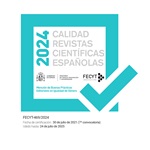El ideal krausista de la independencia de la mujer. Educación y trabajo. (RI §426796)

The krausist ideal of women’s independence. Education and work -
Rafael Díaz Moya
El presente trabajo aborda el estudio de la influencia de la ideología de escritores afines al krausismo, desde la Revolución de 1868 en España, en la opinión de un cambio del modelo que debía producirse en la mujer desde finales de siglo XIX caracterizada por ser un ser inferior física y psíquicamente, a merced del varón, que justificaba una forma de vida supeditada a la familia y la crianza de los hijos. La canalización de la vida de la mujer dirigida hacia un cambio que produjera el acceso a la esfera masculina mediante una educación con fines destinados a su independencia a través del trabajo, superando este antagonismo basado en la sexualidad de los medios de producción, fue el empeño de un número reducido de krausistas, especialmente de mujeres como Concepción Arenal, Emilia Pardo Bazán o Sofía Tartilán, entre otras.
I. 1. El concepto y los fines de la educación krausista. II. Los principios de las intelectuales krausistas hacia la mujer. III. El krausismo ante el Derecho del trabajo. IV. La educación femenina en la cuestión social. 1. El fundamento de la protección del trabajo de la mujer. V. Conclusiones.
This paper deals with the study of the influence of the ideology of writers related to Krausism, since the Revolution of 1868 in Spain, in the opinion of a change in the model that had to be produced in women since the end of the 19th century, characterised as a physically and psychically inferior being, at the mercy of the male, which justified a way of life subordinated to the family and the raising of children. The channelling of women's lives towards a change that would bring about access to the male sphere through an education aimed at their independence through work, overcoming this antagonism based on the sexuality of the means of production, was the endeavour of a small number of Krausists, especially women such as Concepción Arenal, Emilia Pardo Bazán and Sofía Tartilán, among others.
I. The concept and aims of Krausist education. II. The principles of Krausist intellectuals towards women. III. Krausism and Labour Law. IV. Women's education in the social question. 1. The basis for the protection of women's work. V. Conclusions.
Documento disponible para usuarios registrados.
Para consultar gratuitamente este artículo primero deberá registrarse como usuario.

 DIRECTORA
DIRECTORA